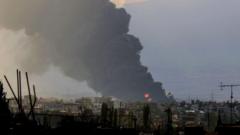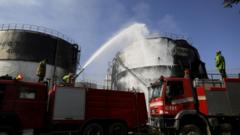Israeli airstrikes in Baalbek, Lebanon, resulted in the death of 19 individuals, including eight women, following evacuation orders for tens of thousands of residents. The strikes targeted Hezbollah infrastructure and have drawn significant international concern over civilian casualties and cultural heritage preservation.
Escalating Conflict: Israeli Strikes on Baalbek Kill 19 Amid Widespread Evacuations

Escalating Conflict: Israeli Strikes on Baalbek Kill 19 Amid Widespread Evacuations
The Israeli military's recent airstrikes on Baalbek have raised international concerns as the conflict deepens, leading to numerous casualties and mass evacuations.
The article text:
Airstrikes carried out by Israel in the historic Lebanese city of Baalbek have reportedly led to the deaths of 19 individuals, as confirmed by Lebanon's health ministry. This escalation occurred shortly after the Israeli military issued evacuation orders for the entire city and surrounding towns, prompting tens of thousands of residents to flee.
Baalbek's Mayor, Mustafa al-Shell, stated that over 20 strikes were noted on Wednesday, with around five hitting within the city limits, which is home to a UNESCO-listed Roman temple complex. The Israeli military claimed these strikes were aimed at Hezbollah command-and-control centers and fuel depots, emphasizing their intent to target military interests of the militant group in the region.
Further complicating the situation, Hezbollah announced its commitment to continue operations opposing Israel, even as its newly appointed secretary-general Naim Qassem vowed to uphold the strategies of his predecessor, Hassan Nasrallah, who died in an Israeli airstrike last month. This development has heightened tensions in Beirut, where many displaced individuals have sought refuge amid ongoing violence.
With more than 1.2 million people displaced nationwide, the humanitarian impact of the conflict is dire. Reports indicate a rapid exodus from Baalbek following the evacuation order, with residents described as scrambling to leave. Videos on social media depicted gridlocked traffic as individuals attempted to flee.
In addition to the casualties in Baalbek, the health ministry reported further fatalities in other areas, indicating a broader and ongoing impact of airstrikes across Lebanon. Israel's military stated its operations targeted Hezbollah’s logistical units responsible for weapon transfers, reinforcing the notion of a widened campaign against the group.
Despite local authorities' assurances that cultural sites remain unharmed, the risk to Lebanon's heritage, particularly the Roman ruins, has raised alarms. UNESCO echoed concerns regarding the protection of such sites in the context of military actions.
As diplomatic efforts progress toward a potential ceasefire, endorsements from notable U.S. officials were made to prioritize the safeguarding of civilian lives and cultural heritage amid these developments. The situation remains volatile with reports of continued military engagements along the Israeli-Lebanese border, revealing a complicated web of conflict exacerbated by regional dynamics.
Ongoing monitoring by global observers reflects a growing international interest in the events transpiring in Lebanon, marking a critical moment as local authorities await potential resolutions to the unrest that has plagued the region in recent weeks.
Airstrikes carried out by Israel in the historic Lebanese city of Baalbek have reportedly led to the deaths of 19 individuals, as confirmed by Lebanon's health ministry. This escalation occurred shortly after the Israeli military issued evacuation orders for the entire city and surrounding towns, prompting tens of thousands of residents to flee.
Baalbek's Mayor, Mustafa al-Shell, stated that over 20 strikes were noted on Wednesday, with around five hitting within the city limits, which is home to a UNESCO-listed Roman temple complex. The Israeli military claimed these strikes were aimed at Hezbollah command-and-control centers and fuel depots, emphasizing their intent to target military interests of the militant group in the region.
Further complicating the situation, Hezbollah announced its commitment to continue operations opposing Israel, even as its newly appointed secretary-general Naim Qassem vowed to uphold the strategies of his predecessor, Hassan Nasrallah, who died in an Israeli airstrike last month. This development has heightened tensions in Beirut, where many displaced individuals have sought refuge amid ongoing violence.
With more than 1.2 million people displaced nationwide, the humanitarian impact of the conflict is dire. Reports indicate a rapid exodus from Baalbek following the evacuation order, with residents described as scrambling to leave. Videos on social media depicted gridlocked traffic as individuals attempted to flee.
In addition to the casualties in Baalbek, the health ministry reported further fatalities in other areas, indicating a broader and ongoing impact of airstrikes across Lebanon. Israel's military stated its operations targeted Hezbollah’s logistical units responsible for weapon transfers, reinforcing the notion of a widened campaign against the group.
Despite local authorities' assurances that cultural sites remain unharmed, the risk to Lebanon's heritage, particularly the Roman ruins, has raised alarms. UNESCO echoed concerns regarding the protection of such sites in the context of military actions.
As diplomatic efforts progress toward a potential ceasefire, endorsements from notable U.S. officials were made to prioritize the safeguarding of civilian lives and cultural heritage amid these developments. The situation remains volatile with reports of continued military engagements along the Israeli-Lebanese border, revealing a complicated web of conflict exacerbated by regional dynamics.
Ongoing monitoring by global observers reflects a growing international interest in the events transpiring in Lebanon, marking a critical moment as local authorities await potential resolutions to the unrest that has plagued the region in recent weeks.



















